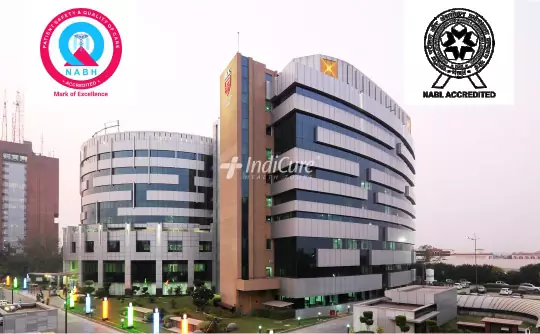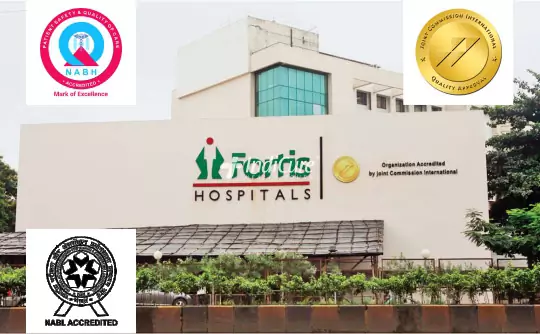

Slipped Disc Operation Cost in India starts from US $4500 and varies depending on your medical condition, history and comorbidities, if any, surgeon, hospital and the city where you choose to get the surgery done.
A significant portion of the overall cost of the surgery arises from the use of any customized surgical instruments or specialized computer technology. With the hopes of improving patient care, new techniques and technologies are often introduced to the surgical process. Such innovative advancements in the surgical approach can increase costs.
Having your slip disc operation in an accredited surgical facility by skilled and qualified medical staff is a critical factor. Moreover, the geographical location of this facility also affects the quote. But, IndiCure provides you with a projected estimate that will be all inclusive and affordable.
An important expense when it comes to your slipped disc operation is going to be your spine surgeon's fees. IndiCure recommends only experienced, skilled, board-certified surgeons who are capable of delivering successful herniated disc surgeries. Although the charges may vary depending on the experience of the surgeon, you can be assured to be in safe hands with IndiCure.
The surgery-related expenses include the pre- and post-surgical expenses. The pre-surgical expenses are associated with the age and medical condition of the patient and thus the number and type of investigations required. Post-surgical expenses may include prescription medications, physical therapy, and follow-up consultations.
We at IndiCure, understand that you travel with a budget in mind and do not like to be greeted by surprises after arrival in India. We thus club all these expenses and give you the package cost that is inclusive and affordable at the same time.
Your case manager shall give you an estimated cost of your surgery after discussing your medical reports with the surgeon. The final cost, however, shall be confirmed after your consultation with the Surgeon.

New Delhi
BL Kapur Memorial Hospital is one of the biggest standalone private hospitals in Delhi, NCR. Established by late Dr. B L Kapur, an eminent Obstetrician, and Gynecologist on invitation by then Prime Minister of India, Mr. Jawahar Lal Nehru. The institute went on to become one of Delhi's premier multi-specialty hospitals.

Mumbai
Fortis Hospital, Mulund is a 300 bedded multispeciality tertiary care facility situated in the centre of the city, offering a range of clinical, diagnostic, and surgical services. The hospital began operations in 2002 and since then has achieved various milestones. The hospital is a JCI and NABH accredited facility and among very few hospitals to have NABH accreditation for Blood bank and NABL for Pathology Laboratory.
In fact, we have Special Negotiated Rates with the Hospitals and you can avail Discounted Rates when you choose to Travel with IndiCure.


We Help you Choose the Right Treatment, Surgeon & Hospital

We Arrange Video/Telephonic Consultation with the Surgeon

We Assist you with Visa & Accommodation

We Receive you at the Airport and Drop you at Hotel/Hospital

We Assist you the at Hospital & Provide Post Operative Support
Slipped disc is also known as a prolapsed or herniated disc. It is a disorder where the nucleus pulposus, the inner soft component of the disc, protrudes through the weak or ruptured part of the disc, pressing on the nearby structures (nerves exiting the spinal cord), causing numbness, tingling, or even pain in the area.
Any level can experience a slipped disc or disc herniation, but the lumbar region is where it typically happens. The severity of the symptoms depends on the prolapse and herniation's extent; the bigger the prolapse, the more severe the symptoms.
Intermittent and persistent back pain are early signs of spine degeneration, but you can still go about your everyday activities. However, as the "jelly" begins to protrude from the "shell," symptoms start to worsen; the pain becomes more intense, frequent, and persistent. If the pushing gel starts to squeeze the spinal nerves in the lumbar region, you can also notice weakness or numbness in your legs and buttocks.
Shoulder and arm pain results from a cervical spine rupture, and continued compression could result in lifelong paralysis.
Slipped disc is typically the final step of spine deterioration. The outer layer of your disc starts to tear when it is bent awkwardly or repeatedly, compressed, rotated, heavy objects are lifted, you sit in one place for an extended period of time, etc.
If no steps are taken to stop additional damage, the gel inside the disc begins to move out, resulting in excruciating back pain. If the pressure increases, the nucleus pulposus splits and the water inside leaks, just like a vehicle tyre that has been punctured, weakening the disc and reducing its buoyancy.
In cases when symptoms have not subsided after six weeks of conservative treatment, such as medication, injections, and physical therapy, surgery is frequently the last option and is recommended for patients. In order to relieve pressure on the spinal cord, the prolapsed portion of the disc will be removed during surgery.
Some of the common causes that cause slip disc are:
Treatment options for a slipped disc include rest with pain medication, physical therapy or sometimes further treatments like injections and surgery.
People with back pain, numbness or weakness in upper or lower limbs who are not responding to non-surgical treatments like pain killers, non-steroidal anti-inflammatory drugs and physiotherapy can consider surgery. They need further investigations like X-ray/ CT scan/ MRI to confirm bulging or protruding discs which can be corrected by surgery.
Surgery for herniated disc should be considered emergency if there are symptoms of pressure on the spinal cord or on the cauda equina or cases involving serious or increasing paralysis.
We at IndiCure completely understand your concerns and it is always our endeavor to provide the best outcome for every patient. Following is the list of questions you must ask before you embark on your journey for slip disc operation in India.
Prepare to answer questions about your:

The most common procedures used to treat disc herniation are endoscopic discectomy and laminectomy. These surgeries are usually done under general anesthesia.
In order to provide the surgeon better access to the affected area of your spine and to relieve pressure on your chest, belly, and pelvis, you will lie face down on a special curved mattress. Because the treatment is done under a general anesthetic, you won't feel any pain and will be unconscious throughout. The entire process takes at least an hour, but depending on how complicated it is, it might take considerably longer.
An X-ray will be used to calculate the precise amount of decompression necessary. Your back will be cut in the middle, with the incision going vertically along your spine. Your back muscles will be pulled away from your spine, revealing the back of your spine.
The strain on the spinal cord or nerves will be relieved by gradually removing the damaged tissues or nerves. After a sufficient amount of decompression has been achieved, the incision will be closed and stitched up, and the muscles will be sewn back together.
The results of slip disc operation are good. A successful surgery relieves the symptoms of herniated or slipped disc in up to about 90% of the patients.
Recovery is different for each patient. Generally speaking, it is normal to experience discomfort at the site of the operation for the first few days. This pain can be managed with pain medications. After a week following surgery, you would be instructed to begin physical therapy for rehabilitation. While you could resume your regular activities in approximately two weeks, a full recovery might take many weeks to months. Your surgeon will guide you on the rehabilitation process and when to begin strenuous exercises.
Up to 2% of people in the US experience a herniated disc each year. The most common cause of pain in the neck, arms, back, legs, and/or feet is herniated discs (sciatica). Herniated discs can arise anywhere along the spine, but they most frequently do so in the neck or lower back.
Herniated discs are most common in people between the ages of 30 and 50. Men are twice as likely to get a herniated disc as compared to women. Factors that increase the chances of disc herniation:
Up to 90% of persons with herniated disc discomfort experience relief on their own or with straightforward medical treatment. Within a month, you'll probably feel better. You should visit your healthcare practitioner if you don't. Some patients require more drastic medical treatments, such as surgery or spinal injections.
Herniated discs can deteriorate if left untreated. This is particularly true if you maintain the behaviors that contributed to it, such as if it resulted from your occupation. Chronic (ongoing) discomfort, loss of feeling, and a worsening disc rupture can all occur in the affected area.
Herniated discs cannot always be prevented. However, you can lower your risk by
Depending on the type of surgery, slipped disc surgery takes anywhere between 1-3 hours.
While there is some discomfort from the surgical incision, many patients report that the pain from the herniated disc is quickly relieved. Pain alleviation may take longer in patients who have endured nerve compression and the accompanying symptoms for a prolonged period of time.
Enhance your medical journey to India by availing these extra services.
Traveling abroad for medical reasons may be challenging. With our experience of over a decade and working with the best surgeons and top hospitals in India, we help make your medical tour easier and safer for you. We will guide you at every step of the way and make end-to-end arrangements for your surgery, travel, and stay.
Ramandeep Dhaliwal
I had great experience having rhinoplasty through Indicure. Dr. Ruchika from Indicure has helped me in finding best plastic surgeon, answering all my questions...
Read More
Joshua Archer
My name is Joshua Archer I'm from New Zealand, bay of plenty, kawerau I opted for the bypass surgery in January 2023 but planned it in advance for 28 September found IndiCure...
Read More
Kera Ren
Absolutely loved my experience with IndiCure - from first inquiring to meeting the surgeon pre op to my follow up post op. The surgeon was extremely approachable...
Read More
Andreana Paul
Had a wonderful experience. Visited India for my plastic surgery. From sending mails, airport pickup, comfortable accommodation and, to smooth hospital appointment booking...
Read More
Brandi Luce
I had the privilege of using Indicure's services for a cosmetic procedure that I had wanted for a long time but had always been apprehensive about. Ruchika helped me...
Read More
Jade M
Indicure Health Tours went above and beyond my expectations. They helped me with every aspect of my journey and were professional, kind and caring. I was...
Read More
The content on the website (www.indicure.com) is intended to be general information and is provided only as a service. All photographs on our website of before and after results are examples only, and do not constitute an implied or any other kind of certainty for the result of surgery.
Learn about IndiCure Health Tours' comprehensive editorial policy that strives to deliver trustworthy, helpful, relevant, accurate and people-first content on medical tourism in India.
It is not medical advice and should not be taken as medical advice. It should not be used to diagnose or treat a health condition and is in no way meant to be a substitute for professional medical care. You are advised to see a surgeon in person to assess what surgery may or may not accomplish for you.
It is also important to keep your expectations realistic and to understand that all surgical procedures carry risks and should never be taken lightly.